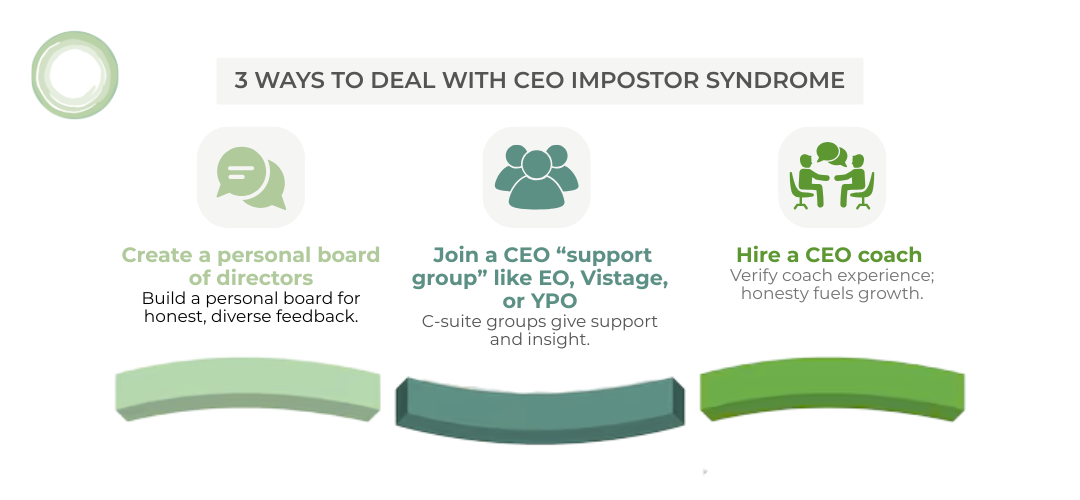Is there such a thing as CEO Impostor Syndrome?
When most of us hear Impostor Syndrome we picture 20-somethings who are new to their fields and feeling out of their depth. We might imagine fresh-faced new hires, struggling through client interactions and meetings, worrying that they’ll be “found out.”
What if I told you that 90% of CEOs have had Impostor Syndrome-type thoughts at one time or another? Maybe it was when their company went public, the moment they gave their first town hall speech, or when they acquired a new company. Whatever the situation, there’s a CEO who’s been there and thought, “I’m not sure I belong in this role.”
While I’ve seen it at organizations of all sizes, the Impostor Syndrome is particularly common among younger CEOs and at start-ups — which makes sense! Imagine going from college senior to tech billionaire in just a few years!
CEO Impostor Syndrome may not be constant or all-consuming. It does, however, pop up and occurs often enough to impact leadership, create deep moments of doubt and dramatically reduce executive presence.
Struggling with moments of doubt in a high-stakes role? Our Leadership EDGE program is designed to help CEOs strengthen presence, confidence, and clarity — especially in times of uncertainty.
Why do CEOs struggle with Impostor Syndrome?
At its core, the CEO is a lonely role. Every other role on the team — the head of marketing, HR, operations — has someone to complain to. Each of those people can come to you, the CEO, to voice their concerns, get feedback and elicit support or praise.
CEOs don’t have that luxury.
When you’re a CEO, your every move is monitored and interpreted. Let’s say you forget to greet someone as you enter the building. It might be because your company is growing so fast that you’re not even sure if this person is an employee, a vendor or a contractor!
Maybe — because you’re a human being just like everyone else — you had a rough morning. You’re worried about your aging parents, your teenager’s grades and your dog limping this morning. You’re so deep in thought, you forget to greet someone and, all of a sudden, you’re a villain.
When you’re a CEO, you are effectively on stage at every moment. Many CEOs forget this and get burned. One of our CEO clients lost his temper and threw a chair … behind closed doors, in his own office, with only one other person present. Regardless, the story spread like wildfire.
It’s also incredibly difficult for CEOs to get honest feedback from their staff. We all need honest feedback in order to grow, but nobody wants to tell their boss that they’re passive–aggressive, loquacious or disorganized.
This exacerbates CEO Impostor Syndrome because execs know they’re not getting the honest feedback they need. Without that feedback, it’s easy to second-guess yourself and your decisions. “Was the team more frustrated than they let on about those last-minute changes?” “How does the marketing team really feel about our new initiative?” The self-doubt cycle can be endless.
Thankfully, the field of CEO coaching is growing and organizations like are giving growth-stage company CEOs the support they need. Services like these help CEOs of smaller companies focus on the right priorities and recognize that words and actions count at every moment. These programs also help CEOs deal with the stress of being someone whose words and actions count at every moment!
Feeling like you’re always “on stage” as a leader? Learn how our executive coaching for CEOs helps leaders navigate visibility and pressure without losing their center.
3 ways to deal with CEO Impostor Syndrome
1. Create a personal board of directors
If you’re a CEO, you probably have a business board of directors. But what if you had a personal board of directors — a group of smart, capable people who have your best interest at heart and aren’t afraid to give you honest feedback?
Your personal board of directors should include senior advisors you keep in touch with regularly — other CEOs, attorneys, financial advisors. This should be a diverse group of people, with different career tracks, mindsets and strengths.
You might want to include someone in your industry, someone who has been in your circumstances, someone who’s your cheerleader and someone who can give you constructive criticism.
What’s most important is that you can have completely unfiltered conversations with your personal board of directors and they will give you unfiltered (but kind!) feedback.
2. Join a CEO “support group” like EO, Vistage, or YPO
The struggles facing CEOs are unique; not many people can empathize with the challenges of leading a 200-person company through a merger. But when you join a group made up of other C-suite execs, you have a built-in support group of people who know the challenges that come with the CEO title.
The bonus, of course, is that you can also use these groups to network and learn from each other. You’ll find out how other CEOs deal with hiring mistakes, take back the upper hand, and shift their mindsets around delegation.
3. Hire a CEO coach
Before you hire a coach, research their background and previous clients. Unfortunately, many coaches call themselves “CEO coaches” when they’ve only worked with one CEO or they’ve worked with execs who lead small, five-person companies.
Ask for references. How big are your coach’s clients’ companies? Is your coach helping CEOs who lead a 100-person organization or a 1,000-person organization?
It’s also helpful to learn if your coach specializes in a specific business lifecycle stage. Does she have experience working with CEOs whose company is experiencing rapid growth? High turnover rates? Industry automation?
As a CEO, it can be hard to admit that you’re dealing with self-doubt or moments of Impostor Syndrome. But the sooner you can be honest with yourself, the sooner you can do something about it.

If you need support, objective feedback, or CEO coaching from coaches with deep expertise, we’d love to talk with you! Get in touch to schedule a call.


